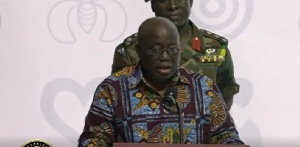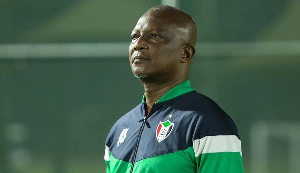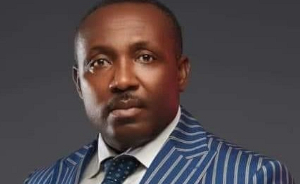President Nana Addo Dankwa Akufo-Addo has advocated for clear-cut exit strategies for programmes designed to help the poor and vulnerable to avoid undue reliance on long-term aid projects.
He said aid programmes and initiatives, such as the Livelihood Empowerment against Poverty (LEAP), must be structured to enable beneficiaries to lead independent lives.
“I remember when the LEAP programme was envisaged and introduced under President Kufuor, we were clear in our minds that whereas we wanted it to cover all those who would qualify under the definition of the programme, it was meant to be a hand-up, not a hand-out,” he said.
Speaking at the Fourth Rotary International District 9102 Conference in Accra on Friday, President Akufo-Addo said: "If someone has to go on the LEAP programme, it should not be for the rest of that person’s life. There should be a definite time limit to being a LEAP beneficiary, and the beneficiary should be able to stand on his or her own after the stated period.”
The President, himself a Paul Harris Fellow of The Rotary Club, Accra South, said after 60 years of independence, “I want us, in Ghana, to break out from our aid dependent and charity driven economic outlook. I want programmes that would be dynamic in content and help us to think big and be dissatisfied with remaining poor.”
Touching on the “Six Areas of Focus of Rotary,” President Akufo-Addo noted that members of the Rotary Club had always been well placed to influence events and policies in Ghana.
In the area of Health, he said the infection rates of poliomyelitis, one of the six childhood killer diseases, had been reduced from an annual worldwide infection rate of 350,000 cases in over 125 countries, to a mere 75 cases in only three countries.
This feat, President Akufo-Addo noted, had been achieved through the efforts of Rotary.
“You have taken on the other great killer of our part of the world, malaria, and I wish to congratulate Rotary on your Roll Back Malaria project. It does look as though we are finally making headway in the fight against malaria. This is also the result of collaboration between government and non-governmental organisations,” he said.
Touching on the Water and Sanitation area of focus, President Akufo-Addo said: “I am pleased to learn that you have started the second phase of a six million US dollar Rotary International/USAID Water Collaboration. We could not ask for a better partner than Rotary as we seek to implement our government’s programme to provide potable water and good sanitation to all our people”.
On Basic Education and Literacy, another area of focus of Rotary, the President said: “Education is the only way to give a good head start and provide equal opportunities for all our children.
“This government believes that a lot hangs on the success of our education programmes and we welcome enthusiastically all the help that we can get from organisations such as Rotary in delivering quality education to our people.”
President Akufo-Addo, however, charged Rotary to partner the Ministry of Inner Cities and Zongo Development in its Economic and Community Development area of focus to develop initiatives and projects that would help people in the rural areas.
He urged Rotary to partner the Government in the Planting for Food and Jobs programme, which was launched on Wednesday, April 19, at Goaso in the Brong Ahafo Region, and also in the implementation of the One District- One -Factory initiative.
“It is a programme in which private sector participation is essential. Come and join us make a success of it. You have a lot of people with good business acumen and experience amongst your ranks. There are a lot of opportunities and I invite you to join us bring prosperity to our people,” he said.
President Akufo-Addo said: “We are determined to build a new Ghanaian and African civilisation, where the rule of law works, where individual liberties and human rights are respected, and where the principles of democratic accountability are the foundation of public policy.
“We are determined to forge a new Ghanaian and African who is neither a victim nor a pawn of the world economic order, but who will be a dignified member of a successful, thriving, and prosperous society.”
Click to view details



General News of Saturday, 22 April 2017
Source: GNA

















